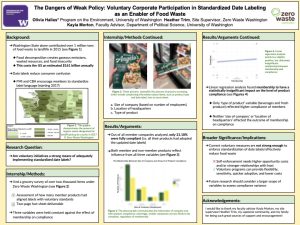The Dangers of Weak Policy: Voluntary Corporate Participation in Standardized Date Labeling as an Enabler of Food Waste
An estimated 60% of food waste from consumer-based sectors ends up in landfills, contributing to methane production and food insecurity, while degrading valuable resources and costing the country billions of dollars. Consumer confusion around date labels on food products is a primary source of this excessive disposal, which can be reduced with broad efforts to streamline label language. This research attempts to determine how influential membership is on the level of product compliance with voluntarily-initiated standardized labeling of “best if used (or freeze) by” and “use (or freeze) by” phrasing. Under Zero Waste Washington, I assessed the status of over two thousand products in a multi-locational grocery survey. These results were compiled in an excel spreadsheet, which organized both member and non-member data, alongside three variables- company size (<10k-0, <50k-10k, <50k-100k, 100k+), location of their headquarters, and the type of product (breads/bakery, canned goods/shelf liquids, beverages, dry goods, dairy/eggs, fresh meat, frozen, and perishables). Coding software Rstudio was then used to generate linear regressions, testing the effect of membership while holding certain variables constant. As hypothesized, membership had a statistically insignificant effect on the level of compliance across all products, regardless of the accounted for potentially influential variables. Due to the threat of food waste on socio-ecological health, resources and efforts should not continue to be invested into voluntary regulation, of which relies on membership to deliver results. Instead other solutions, such as statewide legislation, should be pursued to properly control for unnecessary food waste accumulation at the source.
